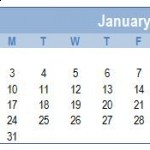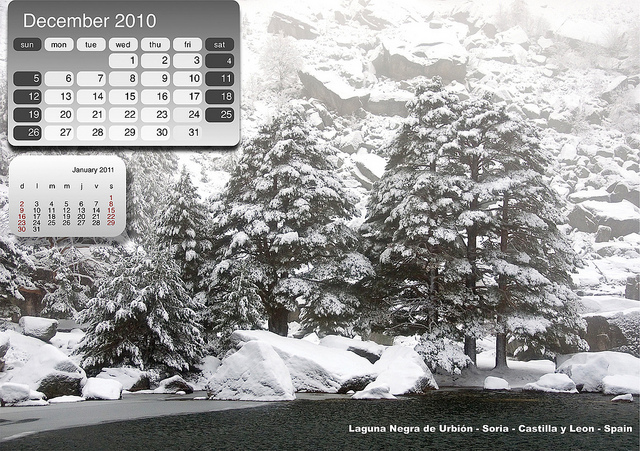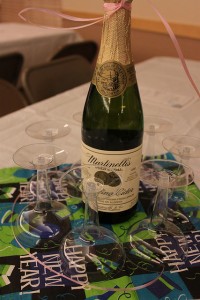Not to bring up a bad dream, but do you recall the tizzy many of us were in 10 years ago. Or 11?
Those of us following the Christian Gregorian calendar were worrying ourselves sick about the new millennium, and not just because a lot of doomsayers said this surely meant the End Was Near.
How calm things seem right now, looking ahead to a new decade.

Just another year, or the start of something big, like a decade? (Alaivani, Flickr Creative Commons)
Or is it a new decade? Must we get into that? The turn of the centuries and millennia was bad enough.
At least we’ll soon be rid of the 20-oughts, or whatever we’re supposed to have been calling the first few years of this century. If you’re like me, you’ve avoided calling them anything at all, waiting and hoping that the “teens” would arrive.
If you think all this is confusing, return with me now to those thrilling days of yesteryear, as the announcer used to introduce the old Lone Ranger radio dramas.
As I said, 11 years ago, in late 1999, a lot of us were nervously preparing for the new millennium, which would start with the flip of the calendar to the year 2000.
Or would it?
Not for a thousand years had a decade, a century, and a millennium changed all at once. It’s the reason hotel rooms on New Year’s Eve in party cities like New York and New Orleans and Paris had been booked solid for years. Unprecedented celebrations were planned all over the western world, especially.
But then millennium scholars, mathematicians, and other purists spoiled the fun. If the calendar in common use worldwide in our modern times was to be believed, they said, the REAL millennium change was a year away, at the end of 2000.
Never mind that in his State of the Union address in January 1999, President Bill Clinton told the nation:
Barely more than 300 days from now, we will cross that bridge into the new millennium.
And he touted his wife, Hillary Rodham Clinton’s, new government initiative called “the Millennium Project” — a series of thought-provoking lectures about the nation’s past and future.
Problem was, there were those who said he was beckoning the nation across that bridge into the new 1,000-year millennium a year too early.
You see, if you accepted the Christian calendar, the Third Millennium wasn’t due to arrive until January 1, 2001.
President Clinton was not the only one to get it wrong. Later in 1999, the Boston Globe newspaper produced a special section on the extravaganzas expected at the end of the year. As the millennium nears, the Globe wrote, there was sure to be a burst of introspection — a toting up of where we’d been and where we were going.
This December 31, when the end is tolled for the 20th Century . . .
Wrong again! Officially, technically — and, yes, correctly — the old century, like the old millennium, wouldn’t be ending for one more year.
Some said it was just those sticklers, pedants, mathematical “geeks,” and crackpots messing up a good thing. Rolling over from the three nines in “1999” to the nice, clean three zeros in the year 2000 seemed like a proper thing to take note of, just as one does when the odometer on an automobile clicks from 99,999 kilometers to a tidy, round 100,000.
To which the perfectionists replied . . . go wild at your millennium parties on New Year’s Eve, 1999, if you must. But right is right. Don’t call it the new millennium or new century — or even the new decade.
Who was responsible for all this millennial confusion?

What hath the good monk wrought? (Wikipedia Commons)
You can blame Dionysius Exiguus, which can be roughly translated from the Latin as “Dennis the Short.” In the 6th century, this monk from Sythia in what is now Romania devised the Gregorian calendar, which is still in use. It began retroactively with what was thought to be the date of the birth of Jesus Christ.
Dennis the Short started his calendar with the year ONE, not zero. Working with Roman numerals, he had no concept of zero!
You have to go through 10 years to make a decade, of course, and 100 years to make a century and 1,000 years to make a millennium. So therefore, thanks to Dennis the Shrimp — he won’t care if I tease him — since the counting began in the year 1, not the nonexistent year 0, new millennia could not begin until the years 1001, 2001, and so on.
Simple as that. (Ha.)
Never mind that as the easy-to-grasp year 2000 was approaching, a whole lot of people wanted to ignore the fact that only 999 years had passed in the Second Millennium. They wanted to start afresh and not wait for the troublesome last year to pass.
This controversy was nothing new.
In 1899, for instance, the pope in Rome, the Times newspaper of New York, and the president of Harvard University all agreed that the 20th century would commence in 1901. But German Kaiser Wilhelm and the president of Smith College, among others, insisted it would begin the very next year, in 1900. We measure a life starting at 0, with birth, the kaiser argued. So if you live 100 years, they’re going to throw a party and call it your 100th birthday. You don’t have to wait to hit 101. Why should we wait until 1901 to start a new century?
There was something terribly wrong with that logic, but it’s not easy to grasp without thinking about it or even taking a pencil to paper.
Wait till we start talking about decades! The oft-remembered 1960s, for instance.
The decade of free love and the women’s movement comprised 1960, 1961, 1962, all the way through 1969. But in keeping with Dennis the Short’s calendar that started counting in year 1, it should have rolled right to the end of 1970. But of course, 1970 couldn’t be the ’60s.
Told you it was confusing.
As New Year’s Eve 1999 approached, American advertisers had no intention of waiting until 2001 to mark the millennium. Hundreds of companies obtained trademarks that allowed them to call themselves the official oatmeal, vacuum cleaner, beer — even artificial fingernail — of the Millennium.
And quite a few of them misspelled the word as “millenium,” with only one “n” instead of the proper two.
Thankfully, no one that I know of called it the “Bi-millennium,” which it really was: the marking of 2000 years and the start of Millennium No. 3.
As you might expect, when the year flipped from 1999 to 2000, there were no Millennium parties at the U.S. Naval Observatory — which keeps the nation’s time — even if the rest of the world was going bonkers with more noisemakers and streamers than usual on New Year’s Eve. It dutifully and soberly waited the correct full year to mark the change of millennia, no doubt with a dignified round of applause and glasses of apple juice.
But interestingly, the Millennium Society, a group of prominent Americans whom the purists would say should know better, threw a black-tie gala for 500 celebrants at midnight, Dec. 31, 1999 at Egypt’s Great Pyramid of Cheops. Sure, it WAS the wrong year. But in the view of of the club, it would be the first time in the history of the species that people all over the planet would be celebrating a millennium, and they wanted to make a big deal out of it.
The Millennium Society’s president was right in predicting that no one to speak of, besides his members, would be doing much beyond the ordinary, ball-dropping, New Year’s-welcoming, Auld Lang Syne-singing fuss come the end of 2000.
So now that you have all that straight, happy new 2011 — when the second decade of the new millennium really starts.
Just ask Dennis the Short.

Beautiful, but hope it's not a metaphorical forecast for the year, or decade, ahead. (R. Duran, Flickr Creative Commons)
Ted's Wild Words
These are a few words from this posting that you may not know. Each time, I'll tell you a little about them and also place them into a cumulative archive of "Ted's Wild Words" in the right-hand column of the home page. Just click on it there, and if there's another word that you'd like me to explain, just ask!
Auld lang syne. Literally from Old English, this term means “the old long ago.” It was popularized in a poem by the Scot Robert Burns and, especially, by a melancholy tune sung at New Year’s Eve, whose words go, in part, “We’ll take a cup o’ kindness yet/ for auld lang syne.”
Go bonkers. To go nuts, to celebrate or act out wildly and crazily.
Tizzy. A flustered or greatly animated state. Sometimes we get “all a-tizzy” over something exciting.





2 responses to “Millennium Flap Redux”
Hello ! And what about the Y2K bug which everyone dreaded because it will cause massive damage to the computers and internet ? So far, all the computers and the internet is still functioning. Except for some incidences. Blessed New Year ahead !
Thanks Ted